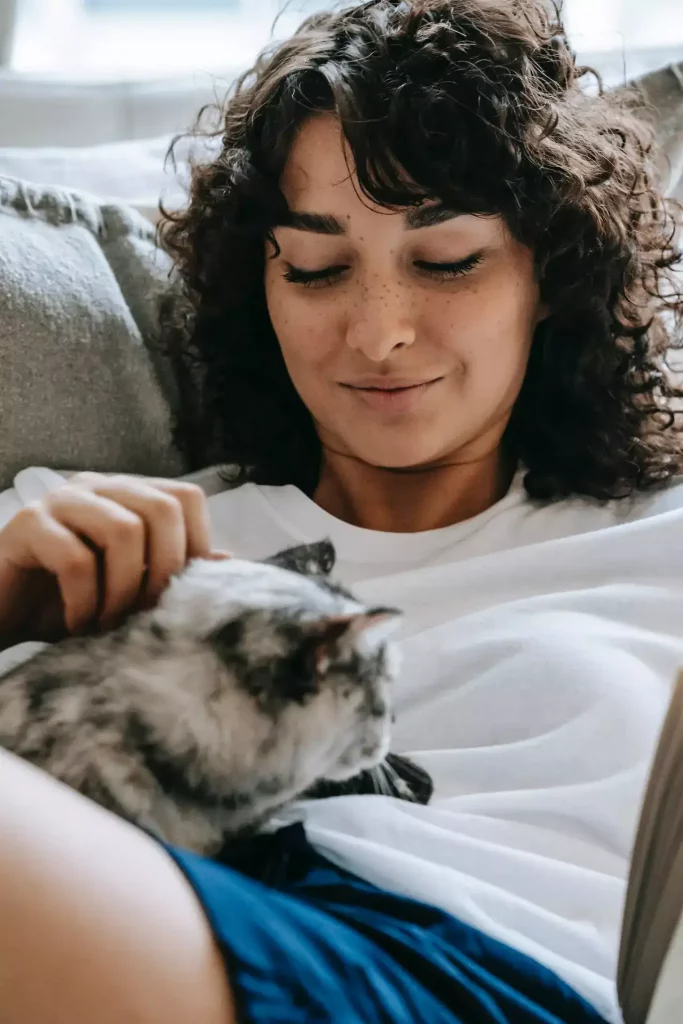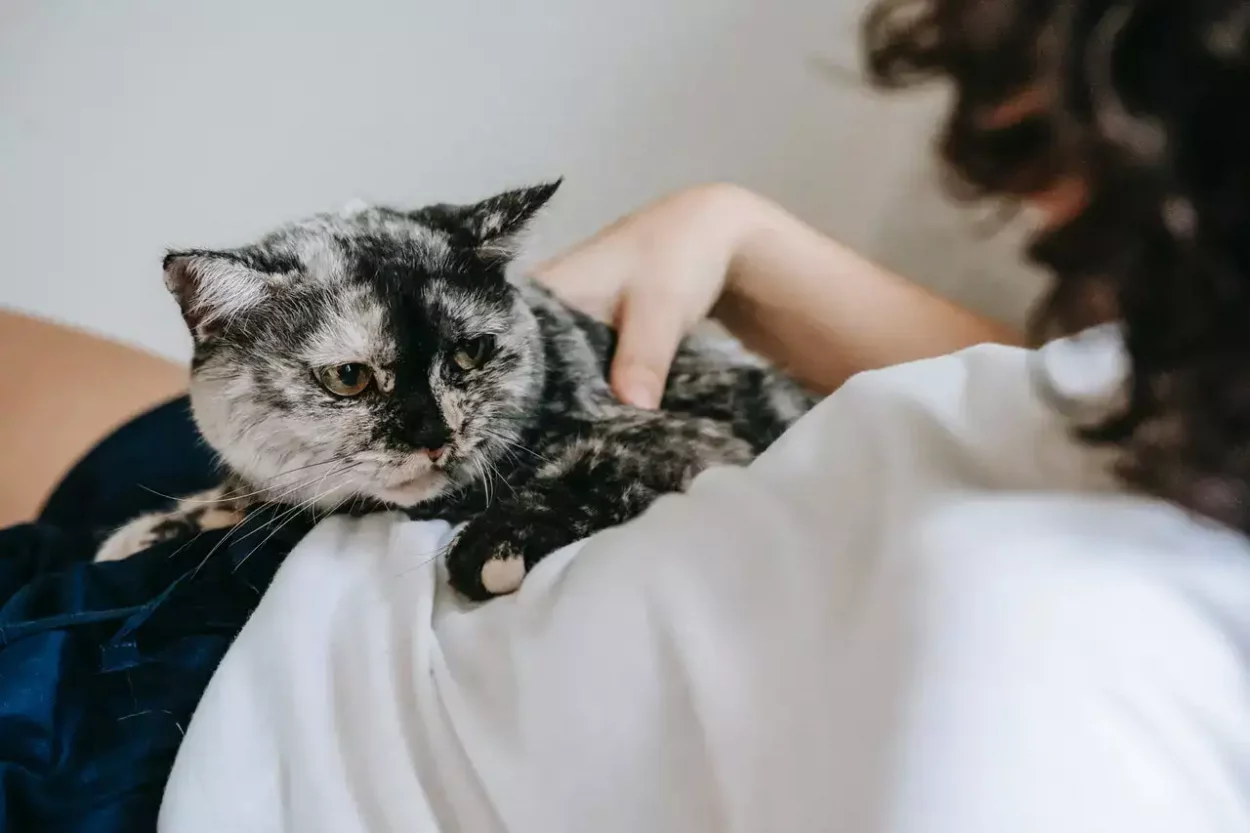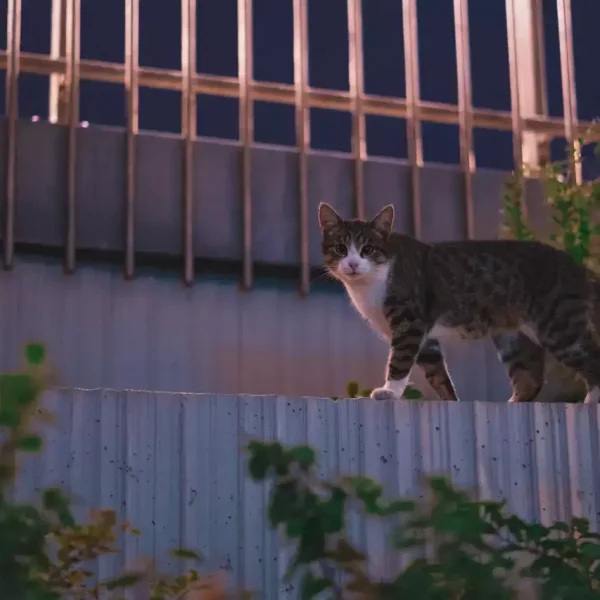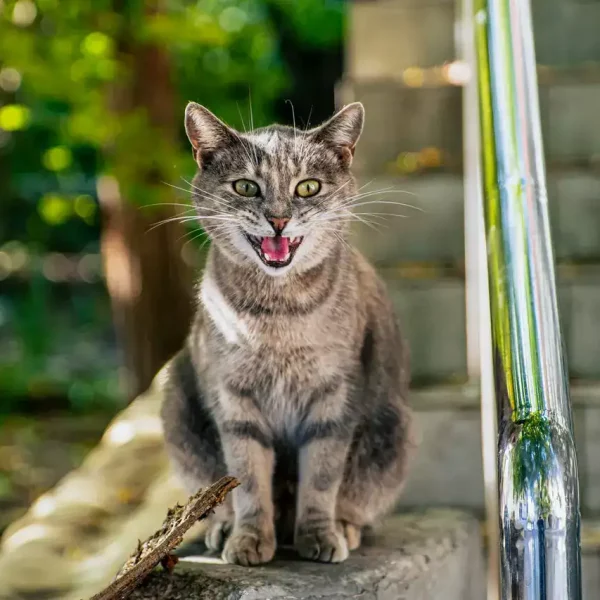Have you ever noticed your cat sniffing around your belly button? They may even try and have a good lick if the opportunity arises! It’s an interesting habit and we all know how much cats are fascinated by different smells and tastes).
But what would make our belly buttons so attractive to our inquisitive cats? Personally I would hate my cat smelling my belly button, it would freak me out – but not enough to have researched it, so here’s why the like to have a sniff at your navel.
Why does my cat smell my belly button? Cats like to smell belly buttons if too much dirt, sweat and oils have built up in the navel. This results in tantalizing smells and taste for a cat to sniff at your belly button. Bacterial or fungal infections can occur in the navel and these infections produce smells too.
There you have it!
A little world goes on inside of our belly buttons and if we’re not keeping it sparkling clean, it’s going to produce interesting smells for our cat that they can’t help by want to sniff at.
But I also discovered cats will smell around your belly button area when you’re pregnant and for other reasons too. Yep, that’s right, some people on social media have even asked whether cats can smell a baby in their stomach.
Read on for more on why cats smell belly buttons and how you can stop it. Your cat’s belly-sniffing habit could be telling you more than you’re aware of!
Why does my cat smell my belly button?
The human belly button can hold all sorts of smells caused by the body’s oils and sweat. It can also harbor an accumulation of dirt if you don’t clean it regularly. And sometimes a fungal or bacterial infection can take root in this crevice.
Have you noticed your cat sniffs around your belly button more often on hot summer days? Or, when you’ve been more active, and your body has worked up a sweat? What’s happening here is your body is producing more oils and salt in response to the heat and physical exertions.
These oils and salts are all over your body including your belly button. If this area is not cleaned well, it will start to smell. And this is what attracts your fur-baby’s attention. Plus, he may even attempt to lick your belly button. Why? Because it’s quite tasty as well!
Belly buttons are homes to well over 70 different types of bacteria. When your belly button is dirty, an infection can set in and your cat will certainly smell it. Yeast infections can also start in this part of the body as it’s creates a cozy, damp, and dark environment perfect for candidiasis.
What else can my cat pick up from sniffing my belly button?
It’s well-known that cats can smell certain changes in the human body. If your cat is constantly sniffing around your belly button, she could be detecting something going on inside your belly.
If you’re a lady, your cat could be picking up on hormonal changes. One of the reasons for new hormones is pregnancy. So, ladies, if you didn’t know about this new development, well, your cat is trying to tell you something is growing inside your belly!
Cats have an incredible sense of smell and studies have shown that they can pick up volatile organic compounds in the human body. VOCs are gaseous molecules which develop either as a result of some bodily changes caused by an illness or from external factors such as diet, pills and exposure to certain environmental toxins.

You can read more about this on the CBS News website… it’s kind of fascinating, if a bit yucky.
So, the next time your cat is sniffing the vicinity of your belly button she could be smelling some VOCs in your belly area. Take note as this could be an indication all is not well with your health.
When should I worry about my cat smelling my belly button?
Have you noticed how a cat will always go straight to a smell, no matter how pungent it is? Until that odor has disappeared or been removed, your cat will keep on going back and sniffing. The same applies with your belly button.
If you notice your cat is persistently smelling your belly button, you should do the following:
- Give your belly button a good cleaning. This includes getting in deep and scrubbing well with soap and warm water. This should remove any dirt and associated smells.
- Take a closer look at your belly button for any tell-tale signs of infections. This could include a yellowy discharge, swelling, pain, or redness. These are normally the symptoms of a bacterial infection.
- Check for candidiasis. This type of yeast infection can cause a red, itchy rash in or around the belly button area. If the infection is severe, it may produce a white, thick discharge. People with diabetes are more prone to candidiasis in their belly buttons.
- Watch out for any changes after surgery. If infection sets in after abdominal surgery, pus may start oozing from the belly button. Get to your doctor immediately if this is happening.
- Make sure there’s no bloody discharge from your belly button. This could be a symptom of a urachal cyst (formation of a cyst on the urachus).
- Check for any bumps in your belly button. A sebaceous cyst as a result of oil-releasing glands in your body could form in your navel. If the cyst becomes infected the area will become red, painful, and sometimes a thick, bad-smelling discharge will ooze from the cyst.
Your cat’s sniffing habit around your belly button could be telling you something is seriously amiss with your body so don’t ignore it. Rather make an appointment with your doctor even if you don’t notice any of the signs mentioned above.
How can I stop my cat from smelling my belly button?
With smelling comes licking! Sometimes, your cat simply can’t resist having a good lick when she smells and while it may be fine occasionally, it can get annoying. Especially when it’s your belly button she’s after.
How can you stop this annoying behavior? Firstly, make sure your belly button is clean. Secondly, rule out any underlying medical conditions. Once all of these areas have been covered and you’re well and healthy, then you can assume your cat is simply showing you affection.
Use the following tips to help stop your cat from constantly nudging your navel region.
1. Offer a distraction
Make sure you have some of his favorite toys on hand and distract her the next time she starts sniffing your navel or belly. You could also play a game of fetch or take her for a walk.
2. Give your cat enough attention
Your cat could be looking for attention and sniffing your belly button becomes a bad habit to get you to notice her. Instead, make sure she’s getting enough attention by giving her regular hugs and cuddles, and taking her for walks or playing games.
3. Positive reinforcment
If your cat’s persistent need to get to your belly button is driven by a need for attention, then you could try positive reinforcement with his favorite treats. A firm but gentle “No” could also work if she responds well to this form of discipline.
4. Ignore her
Walk away from her every time she puts his nose anywhere near your navel. If you do this often enough, your cat will learn this kind of behavior is not appreciated and she’ll stop.
While all of these tips should help sort out your cat’s bad habit, if you’re pregnant you may have to accept your cat can’t resist being near your tummy. This may be the one time you can let her hang around your belly!



Leave a Comment